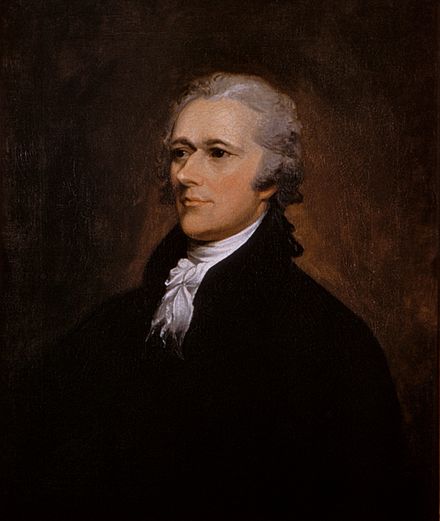This site showcases the work of students in the two Fall 2017 sections of Xavier University’s Hamilton: Then & Now First Year Seminar.
On Slavery
Facsimile/Artifact
https://search.proquest.com/docview/88892200/fulltextPDF/8ABC9CD6579149EAPQ/1?accountid=407
Headnote
My artifact On Slavery, by George Washington discusses how slavery is not ethical. This article was published in Philadelphia in 1799. Washington discusses about how slavery is unethical and how it weakens a slaves character. Washington quotes, “Surely every man who possesses, and is capable of exercising, the powers of reason, should not be restrained from the full benefit of his personal liberty” (324). Washington illustrates on how men are all equal, if they possess reason. Humans possess free will which is major factor that separates us from other animals. With slaves being human and having free will Washington is inferring that they should have personal liberty. Homer quotes, “Jove fix’d it certain, that whatever day makes man a slave, takes half his worth away”. Homer is comparing slavery with worth of life and he is saying if you become a slave you lose half of your worth away. Washington is presenting that slavery takes away a person’s self-worth and is hurting their mind sight on who they are. Moreover, Washington says if you possess reason you should not be a slave, but that is not the case for the millions of slaves in America at the time. Lin-Manuel wrote Hamilton the musical and Alexander Hamilton was a big supporter for the abolishment of slavery. In “Who Lives, Who Dies, Who Tells Your Story”?, Lin has Eliza speak about how Hamilton could of done so much more with slavery if he was still alive. Eliza quotes, “I speak out against slavery. You could have done so much more if you only had”. Eliza is illuminating the significance that Hamilton could of had on slavery if he was still alive. Hamilton ties in with this article because he views on slavery are similar, he did not think it was right for blacks to be fighting for America during the American Revolution and then to be put into chains right after the war. Washington’s article had the right ideas on how to tackle and take down slavery, but he did do any action on it.
eliza picture
Modern Typesetting
On perusing the last number of the Weekly Magazine, I met with a piece On Slavery, which, indeed gave me much satisfaction. The situation of a slave in the best condition in life, I presume has never been desired by any one who has once enjoyed his freedom. Political liberty is the outcry of every American that has the advantage of his personal freedom; and an attempt to infringe upon or lessen this liberty, would be considered as extremely dangerous indeed, if not followed by universal indignation1. then while we declare and defend an universal right, to which every man by the laws of nature are equally entitled as well as us;- Ought we to carry the zeal2 for self-preservation so far in our own favour3, as to lose fight of the condition of thousands of our fellow creatures held in the most pitiful state of abject4 slavery? Surely every man who possesses, and is capable of exercising, the powers of reason, should not be restrained from the full benefit of his personal liberty. The common law of our country regards the slave and his personal rights, equally with those of his master;- But freedom, which id dearer than life itself, is wrested from the unhappy African, who is obliged, most unwarrantably5, to remain subject to the caprice6 and whims7, frequently, of an inhuman despot.
It is difficult to determine on the standard by which the manners of a nation may be tried, whether catholic or particular. It is more difficult for a native to bring to that standard the manners of his own nation, familiarized to him by habit. There must doubtless be an unhappy influence on the manners of our people produced by the existence of Slavery among us. Our children see this and learn to initiate it; for man is an imitative animal. This quality is the germ of all education in him. From his cradle to his grave he is learning to do what he sees others do. If a parent could find no motive either in his philanthropy6 of his self love, for restraining the intemperance8 of his passion towards his slave, it should always be a sufficient9 one that his child is present. But generally it is not sufficient. The parents storms, the child looks on, catches the lineaments10 wrath, puts on the same airs in the circle of smaller slaves, gives a loose to his worst of passions, and thus nursed, educated, and daily exercised in tyranny, cannot but be stamped by it with odious11 peculiarities12.
[1] indignation= The action of counting or treating (a person or thing) as unworthy of regard or notice
[2] zeal= jealousy
[3] favour= to gain goodwill of
[4] abject= rejected
[5] unwarrantably= not right
[6] caprice= a sudden change or turn in mind
[7] whims= freakish idea
[8] intemperance= lack of restraint
[9] sufficient= to satisfy
[10] lineaments= a trace
[11] odious= hated
[12] peculiarities= special characteristic
Work Cited
G, W. “ON SLAVERY.” The Weekly Magazine of Original Essays, Fugitive Pieces, and Interesting Intelligence (1798-1799), vol. 3, no. 37, Mar 23, 1799, pp. 324, American Periodicals, http://libproxy.xu.edu:2048/login?url=https://search.proquest.com/docview/88892200?accountid=407.
